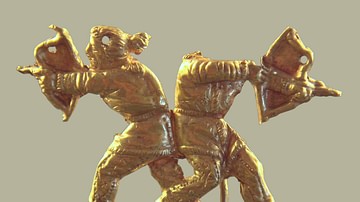Search
Did you mean: Epona?
Search Results

Definition
Battle of Agincourt
The Battle of Agincourt on 25 October 1415 saw Henry V of England (r. 1413-1422) defeat an overwhelmingly larger French army during the Hundred Year's War (1337-1453). The English won thanks to the superior longbow, field position, and discipline...

Definition
Carthaginian Army
The armies of Carthage permitted the city to forge the most powerful empire in the western Mediterranean from the 6th to 3rd centuries BCE. Although by tradition a seafaring nation with a powerful navy, Carthage, by necessity, had to employ...

Definition
Coyolxauhqui
Coyolxauhqui (pron. Koy-ol-shauw-kee) was the Aztec goddess of the Moon or Milky Way who was famously butchered by her brother Huitzilopochtli, the god of war, in Aztec mythology. This story was commemorated in a celebrated large relief stone...

Definition
Boeing B-29 Superfortress
The Boeing B-29 Superfortress was a four-engined, long-range bomber of the United States Air Force. The largest of all Second World War (1939-45) bombers, B-29s were used to strike Japanese targets from the summer of 1944. In August 1945...

Definition
Roman Naval Warfare
Military supremacy of the seas could be a crucial factor in the success of any land campaign, and the Romans well knew that a powerful naval fleet could supply troops and equipment to where they were most needed in as short a time as possible...

Definition
Battle of the Granicus
The Battle of the Granicus in May 334 BCE was Alexander the Great's (356-323 BCE) first major victory against the forces of the Achaemenid Empire. Alexander had crossed the Hellespont with his combined Macedonian and Greek forces and stepped...

Definition
Pandavas
Pandavas were the five powerful and skilled sons of Pandu, the King of Hastinapur and his two wives Kunti and Madri. Hastinapur is equated with the current modern Indian state of Haryana, south of New Delhi. The Pandavas – Yudhistira, Bhima...

Definition
Anglo-Nepalese War
The Anglo-Nepalese War (aka Gurkha War, 1814-16) saw the British East India Company (EIC) lose several battles against Nepalese Gurkhas before finally securing victory in a hard-fought campaign that, for the first time, extended EIC control...

Definition
Scythian Warfare
Scythian warfare used state-of-the-art recurve bows and hit-and-run tactics against set infantry formations. Working from nimble horses, Scythian warriors could unleash a cloud of lethal arrows. Known, too, for their innovative use of scale...

Definition
Potsdam Conference - When the WWII Allies Declared Japan Must Surrender
The Potsdam Conference, held from 17 July to 2 August 1945 in Potsdam in eastern Germany, decided how the Allies would deal with a defeated Germany and how they could best conduct the ongoing campaign against Japan as the Second World War...